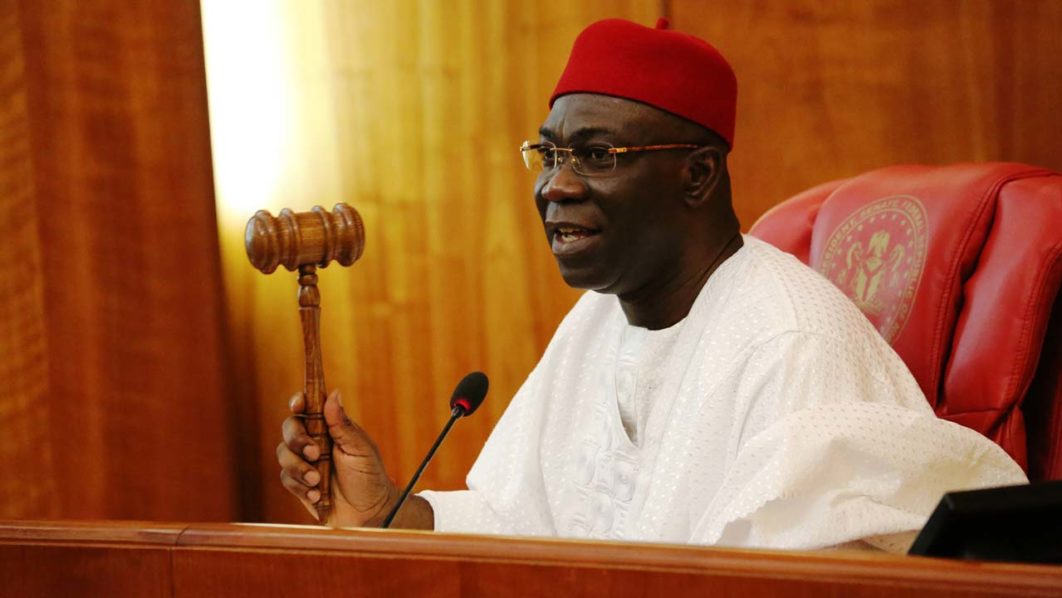- Ekweremadu Proposes Single Term of Five Years for Presidents
The Deputy Senate President, Dr Ike Ekweremadu, has advocated a single-term presidency of five or six years for Nigeria and other African countries to deepen democracy and good governance.
Ekweremadu spoke while delivering a lecture entitled: ‘Constitutionalism and the Challenges of Leadership in Africa: an Evaluation of Tested Models’ on Tuesday.
The event was organised by the Centre for Media and Peace Initiatives, a New York-based international NGO to mark its 10th anniversary.
He said, “A more modest proposal seeks not the abandonment of the presidential system per se but the re-designing of term limits for political chief executives.
“This is in order to reduce the acrimonious conflict, divisiveness and instability arising from partisan or factional competition for executive offices in the federation.
“I support the proposals to transform the current tenure of two four-year terms into a single term of five or six years.
“Among other advertised benefits, single terms would avoid the distractions, manipulations and divisiveness of re-election campaigns while facilitating a more rapid circulation or rotation of power among the various groups.”
According to him, a single term of four years is also less costly as it will reduce the cost of conducting general elections every four years.
Ekweremadu urged Nigeria and other African countries to learn from the failures and successes of older democracies, particularly, the Latin American democracies.
He noted that many of the Latin Americans transited from autocratic regimes to democracies, discovering that the politics of succession, including incumbents’ penchant for self-perpetuation, was overheating the system.
As a solution, they adopted the single term presidency until such a time their respective democracies matured and stabilised, he said.
“It is for this reason that the Senate Committee on the Review of the 1999 Constitution, which I chair, felt, in 2014, that a single term would serve the ends of our current democracy.
“Unfortunately, the recommendation failed because ethnic suspicions and parochial interests prevented reasonable and good faith evaluation of our worthy proposal,” he said.
Ekweremadu also suggested a rotational presidency among the ethnic groups or geographical zones, saying it might prove reassuring to ethnic groups and promote loyalty to the nation.
According to him, the rotational presidency will reassure every constituent part that power will come their way at a given interval.
“Therefore, it may well be time to re-visit the idea of rotational presidency that was first muted in Nigeria by late military Head of State Sani Abacha.”
He suggested a modification of the present presidential system to curtail presidential excesses, and importantly, create greater overlap and affinity between the executive and the legislative arms of government.
“To this end, a hybrid of both the presidential and parliamentary systems will go a long way in keeping the presidency in check, while also reaping the benefits inherent in presidential system.”
He advocated such modification as the introduction of `Question Time’ in the parliament to hold the ministers consistently accountable and the replacement of impeachment with a procedure for vote of no-confidence, among others.
He called for measures to check imperial presidency in Africa and the excesses of many leaders who are allegedly tyrannical and abusive as the military and civilian despots they criticised and replaced.
Earlier, Dr Uchenna Ekwo, the President of the centre, said it had fostered more critical journalism devoted to peace building and holding practitioners accountable.
“We are building a media system that supports peace, dialogue, non-violence and democracy,” Ekwo said.
The representative of the Permanent Observer of AU to the UN, Amb. Omer Mohamed, said Africa should be allowed to adopt a version of democracy peculiar to the continent.
Mohamed, who is also the Permanent Representative of Sudan to the UN, said Africa had had its peculiar challenge and particularly expressed regret over the sectarian crises in many parts of the continent.


 Billionaire Watch3 weeks ago
Billionaire Watch3 weeks ago
 Startups4 weeks ago
Startups4 weeks ago
 News4 weeks ago
News4 weeks ago
 News4 weeks ago
News4 weeks ago
 Bitcoin4 weeks ago
Bitcoin4 weeks ago
 Naira4 weeks ago
Naira4 weeks ago
 Forex3 weeks ago
Forex3 weeks ago
 Treasury Bills4 weeks ago
Treasury Bills4 weeks ago
























